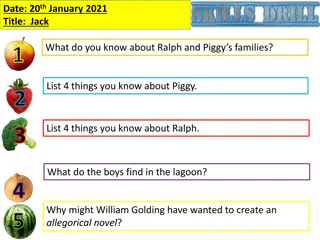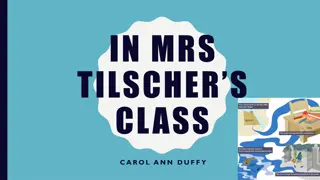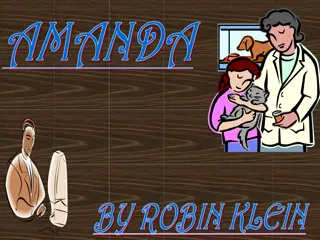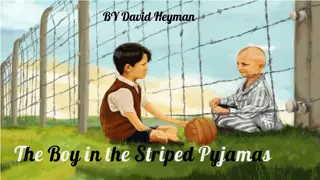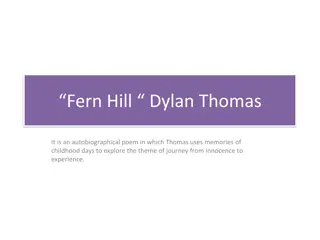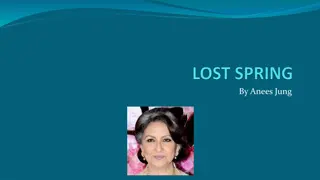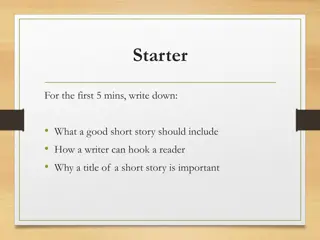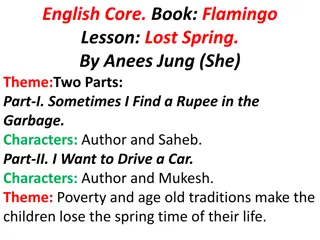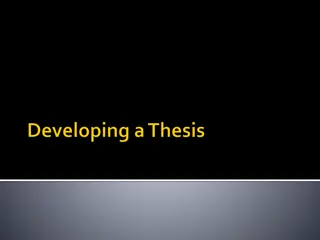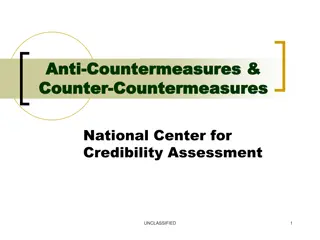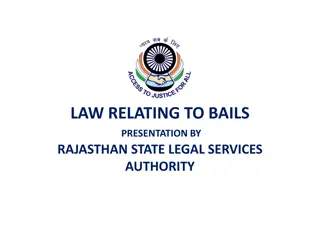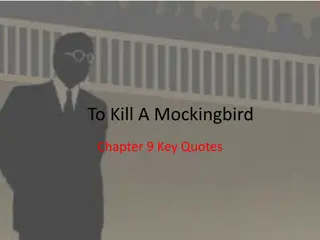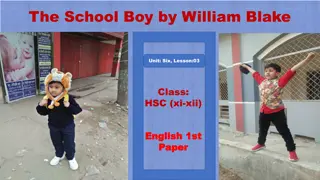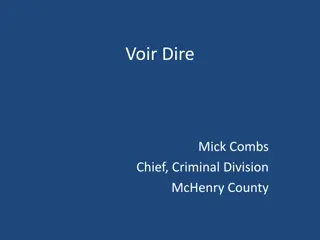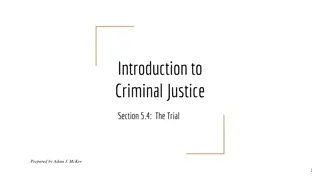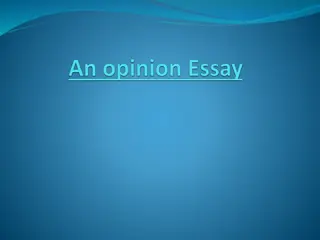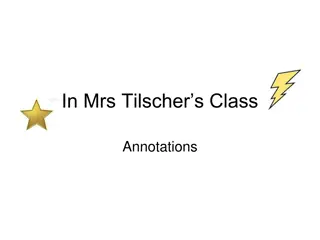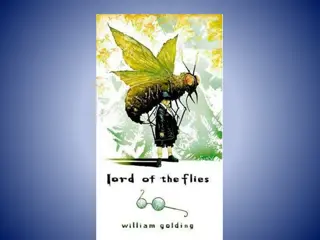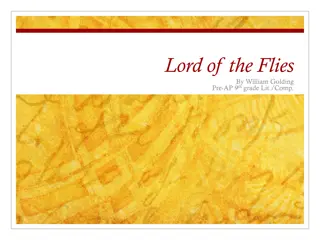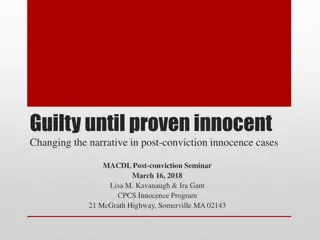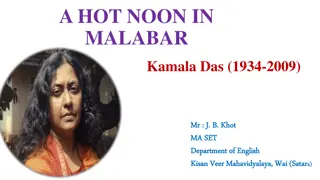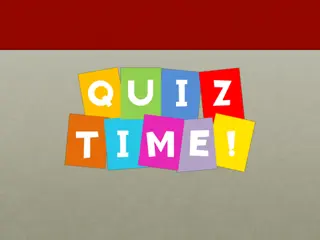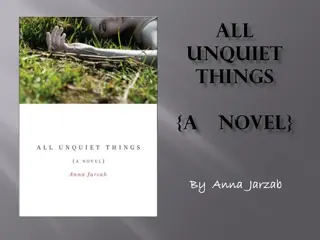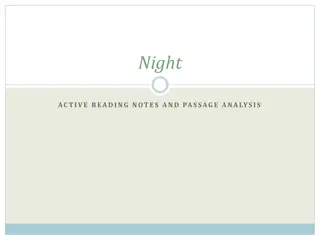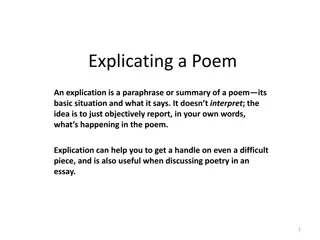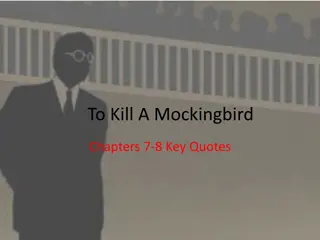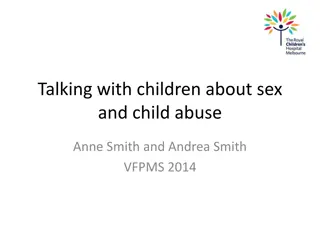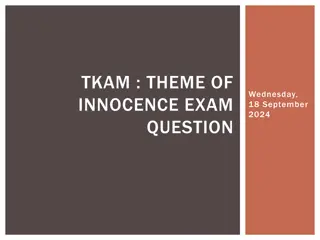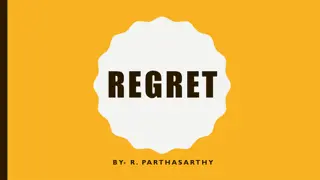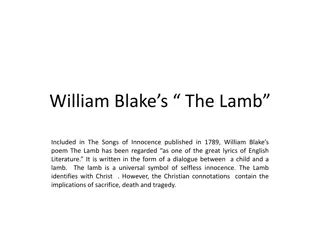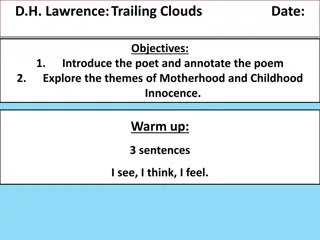RIGHT TO A FAIR TRIAL
The right to a fair trial is fundamental, encompassing aspects such as public hearings, independent tribunals, legal assistance, and the presumption of innocence. Legal frameworks, including the ECHR, the EU Charter of Fundamental Rights, and the U.S. Constitution, provide essential protections to u
3 views • 31 slides
Exploring the Dynamics of Families, Leadership, and Innocence in 'Lord of the Flies'
In 'Lord of the Flies,' the families of Ralph and Piggy are not directly detailed, but we learn about Piggy's intelligence, physical fragility, struggles with his vision, and outsider status, whereas Ralph is depicted as a natural leader, athletic, charismatic, and adaptable. The boys discover a con
0 views • 11 slides
Exploring Themes in Mrs. Tilscher's Class by Carol Ann Duffy
Delve into the enriching symbolism of fertility in "In Mrs. Tilscher’s Class" by Carol Ann Duffy, where the classroom transforms into a vibrant haven filled with innocence and joy. Through vivid imagery and poignant metaphors, the poem captures the essence of childhood experiences, blending nostal
0 views • 7 slides
Robin Klein's Poetic Reflection on Childhood Innocence
Robin Klein's poem portrays the constant nagging of a little girl named Amanda by her mother for various perceived flaws. Amanda imagines herself as a mermaid, an orphan, and Rapunzel in response to the criticisms. The poem highlights the desire for freedom from continuous scrutiny and the impact of
1 views • 17 slides
Exploring Language Features in Storytelling
Delve into the intricate language techniques used to evoke various emotions and portray the innocence of the boy in a seaside setting. Analyze the impact of subject terminology, vivid descriptions, and narrative elements on the reader's experience.
1 views • 16 slides
The Boy in the Striped Pyjamas: A Heart-Wrenching Tale of Friendship and Loss
The Boy in the Striped Pyjamas follows the story of Bruno, a German officer's son, who befriends a Jewish boy named Shmuel during World War II. Their friendship blossoms despite the barriers of a concentration camp, ultimately leading to a tragic end. The narrative delves into themes of innocence, f
0 views • 8 slides
Exploring Innocence and Experience in "Fern Hill" by Dylan Thomas
Fern Hill" by Dylan Thomas is an autobiographical poem reflecting on the journey from innocence to experience through childhood memories. Divided into two parts, the poem vividly describes the poet's carefree days on his uncle's farm juxtaposed with the loss of innocence and realization of the passa
0 views • 5 slides
Unveiling India: The Author and Her Stories
Anees Jung, an Indian female author and journalist, sheds light on the harsh realities faced by underprivileged children in her story "Lost Spring." She emphasizes the importance of education to end child labor and exploitation, urging society to let children enjoy their innocence. The narrative int
0 views • 13 slides
Flowers of War: Margaret's Evacuation in the Highlands
In the short story "Flowers" by Robin Jenkins, set during World War Two in the Highlands of Scotland, Margaret experiences the challenges of war, loss of innocence, and isolation after being evacuated. The title serves as a metaphor, hinting at deeper themes within the narrative. Through the charact
5 views • 21 slides
Exploring Poverty and Lost Childhood in 'Lost Spring'
The story in "Lost Spring" by Anees Jung delves into the harsh reality of poverty through the lives of characters like Saheb and Mukesh. In Part-I, Saheb, a ragpicker, symbolizes the resilient spirit amidst destitution, while Part-II portrays the longing of children like Mukesh for a better life. Th
0 views • 20 slides
Exploring Universal Truths in Literature
Delve into the profound themes of tolerance, courage, hypocrisy, education, respect, prejudice, innocence, justice, and more as authors reveal insights about life and the human condition. See how loss of innocence and seeing from different perspectives impact characters as they navigate the complexi
0 views • 24 slides
Understanding Anti-Countermeasures in Credibility Assessment
Explore the world of anti-countermeasures in credibility assessment, including proactive and reactive actions to prevent or detect countermeasures. Learn how to behaviorally differentiate between guilt and innocence, and the importance of clear warnings against countermeasures. Discover the strategi
0 views • 17 slides
Exploring Characterization in Bernard MacLaverty's 'The Trojan Sofa' through Niall
In Bernard MacLaverty's "The Trojan Sofa," the character Niall, an 11-year-old boy, grapples with fear, innocence, and a desire for his father's approval as he becomes involved in criminal activities. Niall's internal conflicts, innocence, and entrapment by his father's influence are skillfully port
0 views • 37 slides
Understanding Bail Laws: Key Points and Constitutional Guarantees
Bail laws in India, specifically the provisions under the Code of Criminal Procedure, 1973, aim to balance societal protection and individual freedom. The concept of bail is intricately tied to the Fundamental Right to life and personal liberty enshrined in Article 21 of the Constitution. This summa
0 views • 13 slides
Key Quotes and Analysis in "To Kill a Mockingbird" Chapter 9
In Chapter 9 of "To Kill a Mockingbird," key quotes and their analysis shed light on the characters' beliefs and values. Scout's innocence is highlighted as she questions her father, Atticus, about defending Tom Robinson. Atticus explains his moral stance on defending Tom, emphasizing the importance
0 views • 8 slides
Analysis of "The School Boy" by William Blake
In William Blake's poem "The School Boy," a young boy expresses his unhappiness with school, longing for freedom and nature. He resents the joyless lessons and yearns for a life outdoors. The poem highlights the contrast between the boy's desire for joy and freedom with the confinement and sorrow of
0 views • 11 slides
Voir Dire in the Criminal Division of McHenry County
This text provides detailed information about the process of voir dire, specifically in the Criminal Division of McHenry County. It covers the Supreme Court Rule 431(a) regarding the examination of potential jurors, Zehr Principles, and Peremptory Challenges. The content emphasizes the importance of
3 views • 20 slides
Understanding the Criminal Trial Process
The Sixth Amendment guarantees various rights during criminal trials, such as a speedy and public trial, trial by jury, notice of accusations, the right to confront witnesses, and the assistance of counsel. Defendants can opt for a bench trial where the judge decides innocence or guilt. Juries, typi
0 views • 33 slides
Comparing Two Masterpieces: Starry Night vs. Child with a Dove
In this essay, I compare two iconic paintings: Vincent Van Gogh's "Starry Night" and Pablo Picasso's "Child with a Dove." Exploring the intricate details, emotions, and artistic styles portrayed in these masterpieces, I delve into why each painting holds a special place in my heart. From the swirlin
0 views • 10 slides
Memories of Mrs. Tilscher's Primary School Classroom
The poem "Mrs. Tilscher's Class" by Carol Ann Duffy captures the nostalgic reminiscence of a primary school classroom through vivid imagery and descriptive language. The speaker recalls the structure, joy, and innocence of their last year in primary school under the guidance of Mrs. Tilscher. The us
0 views • 9 slides
Insights into "In Mrs. Tilscher's Class" - Themes, Analysis, and Resources
Explore the themes and analysis of the poem "In Mrs. Tilscher's Class," discussing loss of innocence, emotional change, maturity, nostalgia, uncertainty, and love. Access a range of helpful resources and learning intentions related to the text.
0 views • 43 slides
An Analysis of "Lord of the Flies" by William Golding
William Golding's "Lord of the Flies" explores the darker aspects of human nature and society, using symbolism, irony, and literary techniques to depict the descent into savagery when stranded on a deserted island. The themes of good vs. evil, loss of innocence, and the innate nature of humanity are
1 views • 51 slides
Exploring Themes and Symbolism in William Golding's Lord of the Flies
William Golding's novel, Lord of the Flies, delves into the inherent struggle between good and evil, the loss of innocence, and the impact of societal constructs on human nature. Through symbolism, allusions, and literary techniques, Golding paints a vivid picture of a group of boys stranded on an i
0 views • 57 slides
Exploring the Depths of "Lord of the Flies" by William Golding
William Golding’s "Lord of the Flies" is a powerful allegorical novel that delves into human nature, society, and the struggle between civilization and savagery. Set in the aftermath of WWII, the story follows a group of boys stranded on an uninhabited island, each representing different facets of
0 views • 12 slides
Analysis of William Blake's "The Chimney Sweeper" from Songs of Innocence
William Blake's "The Chimney Sweeper" from Songs of Innocence sheds light on the plight of children in a harsh society where young boys are forced into chimney sweeping. Blake criticizes child labor and injustice, portraying the innocence and exploitation of these young workers. The poem delves into
1 views • 7 slides
Insights into "Araby" by James Joyce: Life, Desire, and Alienation
Delve into the atmospheric setting of Dublin, the innocence of childhood adventures, the object of desire in Mangan's sister, the enchantment of infatuation, and the protagonist's sense of alienation in James Joyce's "Araby.
0 views • 8 slides
Uncovering Injustices: Reevaluating Post-Conviction Innocence Cases
Examining cases of post-conviction innocence, this presentation challenges the narrative of guilt and underscores the importance of facts in legal decisions. Through detailed case studies and analysis, the speakers emphasize the critical role of new evidence, cross-disciplinary thinking, and the imp
0 views • 31 slides
Reflections on Childhood in "A Hot Noon in Malabar" by Kamala Das
Kamala Das's poem "A Hot Noon in Malabar" reflects on the nostalgia and longing for the carefree days of childhood spent with her grandmother. Through vivid imagery, she contrasts the lively atmosphere of Malabar with the alienation and discomfort of her present urban life. The poem captures the ess
3 views • 6 slides
Understanding the Power of Persuasion in Criminal Law
Explore the art of persuasion in criminal law, focusing on making effective arguments, analyzing murder statutes, and applying facts to crime elements. Discover how persuasion plays a vital role in convincing juries of guilt or innocence, and delve into the themes of prosecution versus defense.
0 views • 17 slides
Inner Glimpse: Mystery at a Wealthy High School
Anna Jarzab's debut novel "By Anna Jarzab" delves into a mystery surrounding the brutal murder of a troubled girl at a wealthy private high school, intertwining themes of dysfunctional families and perceived entitlements. Narrated from the perspectives of Neily, the ex-boyfriend, and Audrey, the cou
5 views • 15 slides
Understanding 'Night': Family History, Moishe the Beadle, and German Power in Pages 3-12
Pages 3-12 of "Night" by Elie Wiesel reveal the protagonist's family history, interactions with Moishe the Beadle, and the emergence of German power during the Holocaust. Starting in 1941 when Elie is 13 years old, the narrative explores the ignorance and disbelief surrounding the deportation of Jew
0 views • 75 slides
Contemplation of Life in "To a Blossoming Pear Tree
The poem "To a Blossoming Pear Tree" by James Wright juxtaposes the beauty and freedom of nature with the despair and brutality of human existence. The speaker envies the tree's purity and innocence, contrasting it with a grim encounter with an old man in a dark, wintery street. This reflection high
0 views • 6 slides
Key Quotations Analysis from Chapters 7-8 of To Kill a Mockingbird
Explore key quotes from Chapters 7-8 of "To Kill a Mockingbird," analyzing significant moments involving Jem, Scout, and Boo Radley. Delve into themes of innocence, mystery, superstition, and community perceptions through detailed explanations of selected quotations.
0 views • 5 slides
Talking with Children About Sex and Child Abuse: Guidance for Doctors
This series of slides provides guidance for doctors, especially paediatricians, on how to talk sensitively and confidently with children about sex and child abuse. It emphasizes the importance of adapting communication based on the child's developmental stage and mood. The slides stress the ethical
1 views • 31 slides
Theme of Innocence in "To Kill a Mockingbird": Analysis and Discussion
Explore the theme of innocence in "To Kill a Mockingbird" through the development of characters from a state of innocence to experience, ethical and judicial innocence, and the portrayal of characters like Tom Robinson as symbols of innocence. Delve into the significance of innocence in societal nor
0 views • 13 slides
Reflections on Regret and Innocence Lost in the Evening Rain
The poem "Regret" by R. Parthasarthy evokes a sense of melancholy as it describes an evening permeated by rain, regret, and lost innocence. The imagery of lovers entwined by moonlight amidst the sound of roaring waves paints a vivid picture of emotional turmoil and reflection. The speaker laments th
0 views • 4 slides
Symbolism and Analysis of William Blake's Poem "The Lamb
William Blake's poem "The Lamb" from "Songs of Innocence" is a profound dialogue between a child and a lamb, symbolizing innocence and Christ-like qualities. The poem's structure, repetitive refrain, and sound devices enhance its song-like quality, while its questioning nature delves into timeless e
0 views • 10 slides
Presumption of Innocence in EU Directive 2016/343 Explained
This article delves into the essential aspects of the presumption of innocence as outlined in EU Directive 2016/343. It covers the scope of application, burden of proof, right to silence, and other related provisions. The text emphasizes the significance of treating individuals as innocent until pro
0 views • 14 slides
Analysis of D.H. Lawrence's Poem "Trailing Clouds" and Themes of Motherhood and Childhood Innocence
Explore D.H. Lawrence's poem "Trailing Clouds" through an analysis of the poet's background, the context of the poem, and its themes of motherhood and childhood innocence. Delve into the striking imagery, rhythmic structure, and emotional depth of the poem as it portrays the intimate bond between a
0 views • 11 slides
Understanding Ignorance and Innocence from the Old and New Testaments
The concept of ignorance and innocence is explored through the teachings of the Old and New Testaments. In the Old Testament, ignorance was considered sinful and required sacrifices, while in the New Testament, the emphasis shifted towards knowledge and truth through Jesus Christ. Passages from both
0 views • 15 slides

